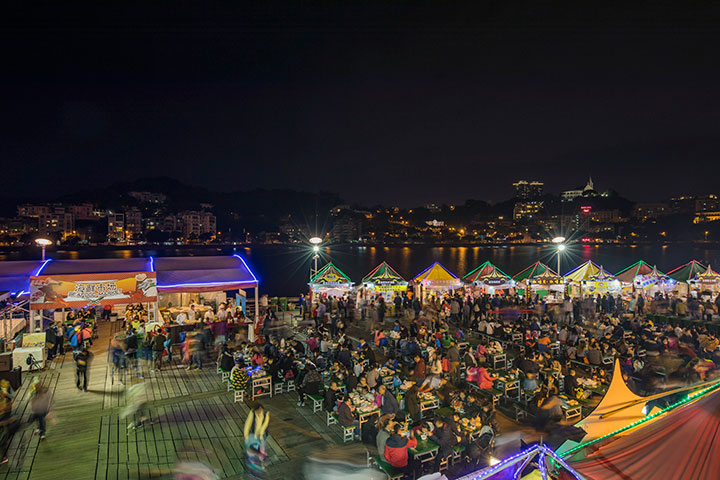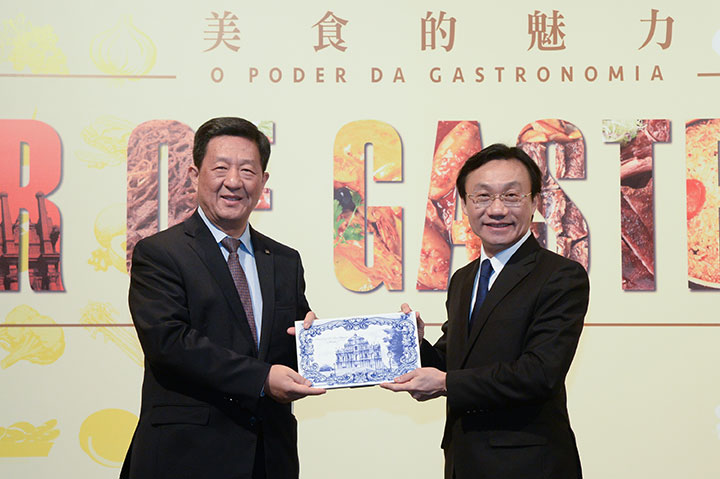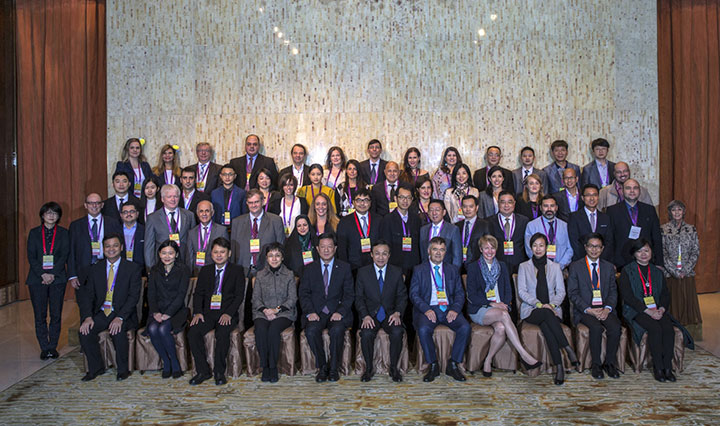Macao designated as UNESCO Creative City of Gastronomy

Macao’s designation as a UNESCO Creative City of Gastronomy propels the city beyond gastronomy and tourism

Secretary for Social Affairs and Culture Alexis Tam expresses his gratitude to Secretary-General of China National Commission for UNESCO Du Yue (left) for his support of Macao’s application during last year’s ‘International Gastronomy Forum, Macao’

Representatives of 16 UNESCO Creative Cities of Gastronomy attended Macao’s first edition of ‘International Gastronomy Forum, Macao’ in November last year
The UNESCO Director-General, Irina Bokova, announced on the early morning of 1st November, Macao time, the designation of 'Macao, China' as a new member city of UNESCO Creative Cities Network (UCCN) in the field of Gastronomy. Macao becomes the third Creative City of Gastronomy in China, after Chengdu and Shunde.
The application for a designation as Creative City of Gastronomy received the support of the National Commission of the People's Republic of China for UNESCO, the Hong Kong and Macao Affairs Office of the State Council of the People's Republic of China (PRC), the Ministry of Foreign Affairs of the PRC and the Office of the Commissioner of the Ministry of Foreign Affairs of the PRC in the Macao SAR. The local Tourism Development Committee, along with the European Oenogastronomic Brotherhoods Council and the China Cuisine Association also gave their supported to the application.
The designation of Macao as a UNESCO Creative City of Gastronomy adds a powerful international brand dimension to the city's portfolio that already includes the listing of The Historic Centre of Macao as UNESCO World Heritage site in 2005, and following the inscription of the collection of 'Chapas Sínicas' (Official Records of Macao During the Qing Dynasty (1693-1886)) on the UNESCO Memory of the World Register. Macao has been an associate member of UNESCO since 1995.
Commenting upon the success of the application, the Secretary for Social Affairs and Culture of the Macao SAR Government and Chairman of the Application of Macao, China for the UCCN Committee, Alexis Tam, said: "I am extremely happy that we have joined UNESCO Creative Cities Network in the field of Gastronomy and am strongly confident that becoming a member of the network will open new horizons for Macao to develop as a diverse, unique and sustainable city. Gastronomy has all along been a distinctive element of our culture in over 400 years of East-meets-West exchanges and we will devote our utmost efforts to bring our unique elements to contribute to the enrichment of the network.
"Macao becoming a UNESCO Creative City of Gastronomy is set to offer a contribution to the city that goes beyond gastronomy and tourism, as it will bring in new models of development that recognize creativity as a strategic factor of sustainable development, which we are willing to take advantage of in partnership with other cities and local partners," highlighted the Secretary.
"This great opportunity to join the network would not have been possible without the strong support of the Central Government - who endorsed our application right from the beginning - for which we are sincerely grateful. We are also very thankful that local tourism stakeholders united to work to prepare the application and for all the guidance and support Macao received from other creative cities and entities during the preparation process. Macao will cherish this new title as a Creative City of Gastronomy and make good use of it to help transform our city into a world centre of tourism and leisure," Alexis Tam added.
To celebrate the designation of Macao as a UNESCO Creative City of Gastronomy, the Macao SAR Government will launch a series of activities locally and internationally to raise awareness of the designation. A number of initiatives will also be rolled out on different fronts such as enhancing vocational training, organizing international gastronomy forums as an annual event, participating in Creative Cities' organized international exchange events, and also the setting up of a management unit comprising both public and private sector to implement and supervise all the initiatives and projects undertaken, amongst others. All actions and initiatives will correspond to the UCCN mission of using creativity as a driver for sustainable urban development.
Designation positively impacts sustainable development
Launched in 2004, the UNESCO Creative Cities Network was created to promote co-operation with and among cities that have identified creativity as a strategic factor for sustainable development with regard to economic, social, cultural and environmental aspects. The Creative Cities Network addresses seven creative fields; namely, Crafts and Folk Art, Design, Film, Gastronomy, Literature, Music and Media Arts.
Aligned with UCCN's mission and objectives, Macao expects the designation to make a positive impact upon the sustainable development of the city, via inheritance, creativity and exchange in the field of gastronomy.
In terms of inheritance, the designation is set to endorse the global recognition of Macao's more than 400-year old culinary legacy, arousing interest among the young generation in gastronomy culture, especially in Macanese cuisine and providing favourable conditions for food traditions to continuously thrive.
As for creativity, the designation is expected to stimulate stakeholders in gastronomy and agents in other creative sectors to explore how culinary and other aspects of culture can fuse to diversify the economy. This will not only broaden the creative capacity in gastronomy but also enable Macao to collaborate with other UCCN members in different creative areas to experiment with synergistic initiatives, such as gastronomy in films, music, design and more.
In terms of exchange, the network is expected to inspire and broaden Macao's creative capacity in gastronomy and crosscutting initiatives by learning from member cities' best practices and experiences, while fostering more opportunities for global co-operation with UCCN cities.
By becoming a member city of UCCN, Macao will be actively engaged in a series of activities conducted by Creative Cities of Gastronomy and other creative fields. Other Creative Cities of Gastronomy around the world include: Chengdu and Shunde (China), Belém and Florianopolis (Brazil), Popayán (Colombia), Rasht (Iran), Parma (Italy), Zahlé (Lebanon), Ensenada (Mexico), Bergen (Norway), Jeonju (South Korea), Tsuruoka (Japan), Dénia and Burgos (Spain), Östersund (Sweden), Phuket (Thailand), Gaziantep (Turkey), Tucson (USA), and this year, eight more cities have also been newly designated.
Over a year of public-private preparations
In preparation for the 2017 UCCN Call for Applications, the Macao SAR Government launched the procedures and related work by the end of 2015. With the support of the Central Government and local stakeholders, in July 2016 an Application of Macao, China for the UCCN Committee (Macao's Application Committee) was initiated, steered by the Secretary for Social Affairs and Culture to formulate directions for the application.
Macao's Application Committee included several working groups, comprising 48 members from 18 entities such as government departments, tourism tertiary institutions, related associations, and the catering industry, among others. Plenary and specialized working group meetings were held to discuss and work on the application, with the Secretary for Social Affairs and Culture entrusting overall co-ordination to Macao Government Tourism Office (MGTO).
Since then, Macao's Application Committee representatives also visited six UCCN cities to exchange ideas with city representatives in support of the preparation process and participate in their international meetings. The cities visited included Beijing (China), Östersund (Sweden), Jeonju (Korea), Phuket (Thailand), Enghien-les-Bains (France) and Dénia (Spain). Field visit studies were also conducted by MGTO apropos the two Creative Cities of Gastronomy in China - Shunde and Chengdu.
Surveys and meetings were conducted with various local stakeholder bodies to collect data and opinions, with activities undertaken to raise public awareness of the potential of gastronomy as a driver of the city's sustainable development.
In addition, Macao hosted the first edition of 'International Gastronomy Forum, Macao' in November of last year. The Forum gathered in Macao representatives from 16 Creative Cities of Gastronomy and one Creative City of Literature, along with experts and academics for exchanges enabling participants to experience the city's gastronomical diversity and cultural heritage. In his keynote speech at the event, the Secretary-General of the National Commission of the People's Republic of China for UNESCO, Du Yue, expressed his full support for Macao's application.
Another important task accomplished in preparation for the candidature was the production of a Macao Gastronomy Website (www.gastronomy.gov.mo) featuring the city's history, culture, festivities, cuisines, related videos and more. The website was launched in English in June this year in support of the application.
Following more than a year of preparation, Macao submitted the application to the UNESCO Secretariat on June 14, under the name of 'Macao, China'. Following a rigorous evaluation process conducted by internal and external consultations with independent experts and the member cities of the network, the Director-General of UNESCO, Irina Bokova, designated in the early morning of 1st November, Macao time, 64 new UNESCO Creative Cities, including Macao.